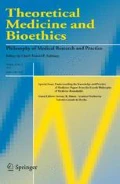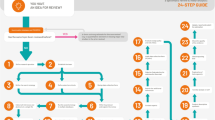Abstract
The achievement of optimal therapeutic results presupposes the use of appropriate treatment combined with maximal utilization of placebo effects. These aims may sometimes be difficult to satisfy in randomized clinical trials (RCTs). The question thus arises whether there is a conflict between the goals of therapy and those of experimental research; and if so, to what extent, and how is it handled in practice by clinicians and researchers. Various ethical problems have been discussed in several reports connected with RCTs. But we have found no discussion concerning the conflict between obtaining informed consent and promoting optimal placebo effects. Information about RCTs can be given in various ways. Sometimes appropriate information about RCTs to patients involves non-optimal utilization of placebo effects. This gives rise to ethical and methodological problems, which are discussed in this article.
Similar content being viewed by others
References
Beecher HK. The powerful placebo.JAMA 1955;159:1602–1606.
Moerman DE. General medical effectiveness and human biology: Placebo effects in the treatment of ulcer disease.Med Anothropol Q 1983;14:3–16.
Wolf S, Pinsky RH. Effects of placebo administration and occurence of toxic reactions.JAMA 1954;155:339–341.
Shapiro AK, Morris LA. The placebo effect in medical and psychological therapies. In Garfield SL, Bergin AE, eds.Handbook of Psychotherapy and Behavior Change. New York: J. Wiley, 1978:369–410.
Park LC, Covi L. Nonblind placebo trial.Arch Gen Psychiat 1965;12:336–345.
Hägg E. Om läkaren som placebo (Physician as placebo).Socilamedicinsk tidskrift 1991;9–10:422–426.
Katz J.The Silent World of Doctor and Patient. London: The Free Press, A division of Macmillan Publishers 1984:193.
Kennedy WP. The nocebo reaction.Med World (Lond) 1961;95:203–205.
Kaada B. Nocebo-Placebos motpol (Nocebo — the antipol of placebo).Nordisk Medicin 1989;104:192–198.
Mancia G, Grassi G, Pomidossi G.et al. Effects of blood-pressure measurement by the doctor on patient's blood pressure and heart rate.Lancet 1983;II:695–698.
Mancia G, Parati G, Pomidossi G, Grassi G, Casadei R, Zanchetti A. Altering reaction and rise in blood pressure during measurement by physician and nurse.Hypertension 1987;9:209–215.
Mengden T, Bättig B, Edmonds D.et al. Self-measured blood pressure at home and during consulting hours: Are there any differences?Hypertension 1990;8 (suppl 3):S15–19.
Pickering TG, James GD, Boddie C, Harshfield GA, Blank S, Laragh JH. How common is white coat hypertension?JAMA 1988;259:225–228.
Olsson B, Tibblin G. Förväntanseffekter vid tonsillitbenhandling. Personligt bemötande gav snabbare tillfrisknande. [Effects of expectancy at treatment of tonsillitis. Personal reception resulted in faster recovery]Läkartidningen 1988;85:610–613.
Wear S.Informed Consent. Patient Autonomy and Physician Beneficence Within Clinical Medicine. Dordrecht, Boston & London: Kluwer Academic Publishers, 1993.
Englehardt TH, Jr.The Foundation of Bioethics. New York and Oxford: Oxford University Press, 1986.
Beauchamp TL, Childress JF.Principles of Biomedical Ethics. New York: Oxford University Press, 1989:349–355.
Wickramasekera I. A conditioned response model of the placebo effect: Predictions from the model. In White L, Tursky T, Schwartz GE, eds.Placebo: Theory, Research and Mechanisms. New York: The Guilford Press, 1985:255–282.
Evans FJ. Expectancy, therapeutic instructions, and the placebo response. In White L, Tursky T, Schwartz GE, eds.Placebo: Theory, Research and Mechanisms. New York: The Guilford Press, 1985:215–228.
Grevert P, Albert HA, Goldstein A. Partial antagonism of placebo analgesia by naloxone.Pain 1983;16:129–143.
Wickramasekera: 255–282.
Taylor KM, Margolese RG, Soskolne CL. Physicians' reasons for not entering eligible patients in a randomized clinical trial of surgery for breast cancer.N Engl J Med 1984;310:1363–1367.
Hellman S, Hellman DS. Sounding board of mice but not men. Problems of the randomized clinical trial.N Engl J Med 1991;324:1585–1589.
Schafer A. The ethics of the randomized clinical trial.N Engl J Med 1982;307:719–724.
Beauchamp: 349–355.
Baum M. The ethics of clinical research. In Byrne P, ed.Ethics and Law in Health Care and Research. Chichester: J. Wiley, 1990:1–7.
Kopelman L. Consent and randomized clinical trials: Are there moral or design problems?J Med and Phil 1986;11:317–345.
Zelen M. A new design for randomized clinical trials.N Engl J Med 1979;300:1242–1245.
Kopelman: 317–345.
Zelen: 1242–1245.
Mill JS. Utilitarianism. London, 1863, reprinted e.g. In Gray J, Mill JS, eds,On Liberty and Other Essays, Oxford and New York: Oxford University Press, 1991.
Bentham J. An introduction to the principles of morals and legislation. In Harrison W, ed.A Fragmentation Government with an Introduction to the Principles of Morals and Legislation. Oxford: Blackwell, 1948.
Singer P.Practical Ethics. Cambridge: Cambridge University Press, 1979.
Hare RM.Moral Thinking. Oxford: Clarendon Press, 1981.
Nagel T.Mortal Questions. Cambridge: Cambridge University Press, 1979.
Nozick R.Anarchy, State and Utopia. New York: Basic Books, 1974.
Author information
Authors and Affiliations
Rights and permissions
About this article
Cite this article
Elander, G., Hermerén, G. Placebo effect and randomized clinical trials. Theoretical Medicine 16, 171–182 (1995). https://doi.org/10.1007/BF00998543
Issue Date:
DOI: https://doi.org/10.1007/BF00998543




